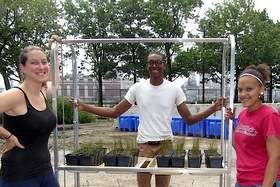Making composting more sustainable

Composting converts organic household waste into a source of nutrients that can enrich garden soil. However, the runoff it produces can be detrimental to the quality of surrounding bodies of water. City College of New York biology major Rebecca Panko has been investigating whether this runoff, or leachate, could be used in a more sustainable way.
For more than a year, she has been conducting research at the Lower East Side Ecology Center under the guidance of Director Christine Datz-Romero and her mentor, CCNY biology professor Amy Berkov. "Christine wanted to make the center's compost facility more sustainable, but we were concerned the leachate would be so rich in nitrates that it would be toxic to plants," Ms. Panko said. "I wanted to see whether the leachate could be used to water plants in an artificial salt marsh."
The Ecology Center's composting system is designed to accelerate decomposition of kitchen scraps, but it produces a lot of wastewater that is discharged into the New York City sewage system. Because New York has a combined sewage overflow system, the leachate at times flows into neighboring waterways.
Ms. Panko conducted her research as an independent study project supported by a community-based partnership grant from CCNY's Colin Powell Center for Leadership and Service. She began in the fall of 2012 with a literature review to learn how other composting facilities dealt with leachate, but turned up no information addressing runoff produced by kitchen scraps.
Then she studied the leachate's chemical composition. While she found that it didn't appear to have high toxicity levels, it was highly acidic.
In August, she acquired a plant species from the New York City Department of Parks and Recreation's Greenbelt Plant Center: Juncus gerardii, a salt marsh plant commonly known as black grass.
She compared growth rates for plants watered with leachate to those given water and found that they grew at equal rates, something she had not expected. "Apparently, even though the leachate is very acidic, it was not harmful to this species," she said. "There was no plant mortality, nor did it damage the leaves."
Anecdotally, she observed that untreated leachate had a foul odor and its color ranged from bright orange to oxide red. However, treating it with pH-adjusting solutions turned its color brown and seemed to decrease the odor. She also noticed that any untreated leachate remaining in the plant trays more than one week appeared to be odorless.
"I feel that something happens when the untreated leachate interacts with plants and soil over time, something similar to pH buffering," she added. It is possible that bacteria in the leachate cause the bad smell and low pH. Soil interactions and pH-buffering may cause unsuitable conditions for the bacteria, thereby reducing the smell."
Although her parents were career rangers with the U.S. Park Service and she grew up in Florida, it wasn't until she moved to New York and worked for a plant store that she discovered her passion. "It's ironic that I moved to the concrete jungle to figure out I want to work with plants," she said, adding that there are unique challenges to studying plants in an urban environment.
Going forward, Ms. Panko, who graduates in May and plans to pursue a PhD in ecology, looks forward to doing further analysis of the nutrients contained in the leachate and publishing her findings. However, she has demonstrated that leachate from kitchen-scrap compost can sustain certain plant species.
That information will be valuable to Lower East Side Ecology Center's goal of constructing a wetlands area at its site to eliminate runoff into the sewer system, enhance local plant diversity and provide educational opportunities for students and community residents. It has applied for a $1.3 million grant to develop the project and expects to hear later this spring.
Provided by The City University of New York


















